Landsberg am Lech is a Landkreis (district) in Bavaria, Germany. It is bounded by the districts of Aichach-Friedberg, Fürstenfeldbruck, Starnberg, Weilheim-Schongau, Ostallgäu and Augsburg.

Dachau was one of the first concentration camps built by Nazi Germany and the longest running one, opening on 22 March 1933. The camp was initially intended to intern Hitler's political opponents, which consisted of communists, social democrats, and other dissidents. It is located on the grounds of an abandoned munitions factory northeast of the medieval town of Dachau, about 16 km (10 mi) northwest of Munich in the state of Bavaria, in southern Germany. After its opening by Heinrich Himmler, its purpose was enlarged to include forced labor, and eventually, the imprisonment of Jews, Romani, German and Austrian criminals, and, finally, foreign nationals from countries that Germany occupied or invaded. The Dachau camp system grew to include nearly 100 sub-camps, which were mostly work camps or Arbeitskommandos, and were located throughout southern Germany and Austria. The main camp was liberated by U.S. forces on 29 April 1945.
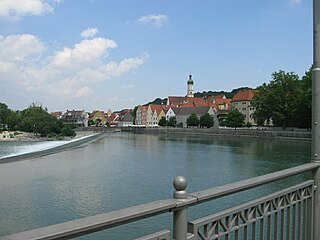
Landsberg am Lech is a town in southwest Bavaria, Germany, about 65 kilometers west of Munich and 35 kilometers south of Augsburg. It is the capital of the district of Landsberg am Lech.

Töging am Inn is a town of 9,382 inhabitants in the district of Altötting, Upper Bavaria, Germany. It lies on the river Inn.

Germering is a town of approximately 40,500 within the district of Fürstenfeldbruck, in Bavaria, Germany. It is directly adjacent to the city of Munich and borders it to the west.

Pocking is a town in the district of Passau, in Lower Bavaria, Germany. It is situated about 30 km south-west of Passau, close to the Austrian border.

Oberschleißheim is a municipality in the district of Munich, and a suburb to Munich in Bavaria, in southern Germany. It is located 13 km north of Munich (centre). As of 2005 it had a population of 11,467.

Schwarzenbach an der Saale is a town in the district of Hof, in Bavaria, Germany. It is situated on the river Saale, 11 km south of Hof.
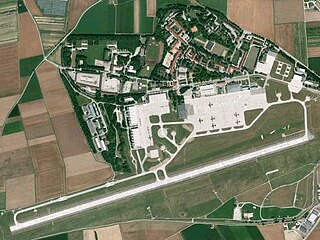
Landsberg-Lech Air Base is a former German Air Force base located near the town of Landsberg am Lech in Bavaria.
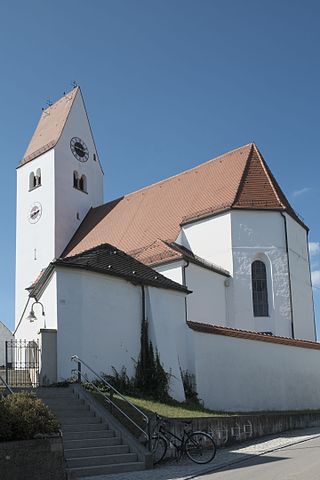
Hurlach is a municipality in the district of Landsberg in Bavaria in Germany.

Igling is a municipality in the district of Landsberg in Bavaria in Germany.
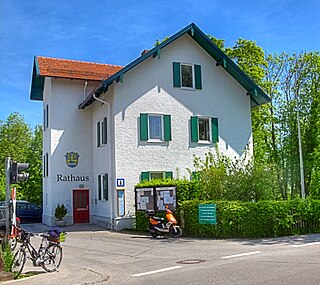
Utting am Ammersee is a municipality in the district of Landsberg in Bavaria in Germany.

Hausham is a municipality in the district of Miesbach in Bavaria in south-eastern Germany.
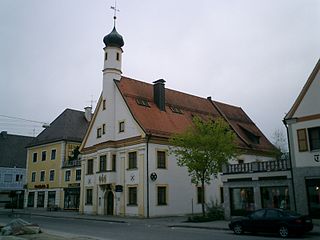
Türkheim is a municipality in the district of Unterallgäu in Bavaria, Germany. The neighboring places of Türkheim are Ettringen, Berg, Rammingen, Irsingen, Wiedergeltingen and Amberg. The administrative collectivity of Türkheim administrate Türkheim and Irsingen. The town is seat of a municipal association with Amberg, Rammingen and Wiedergeltingen.

Kaufering was a system of eleven subcamps of the Dachau concentration camp which operated between 18 June 1944 and 27 April 1945 and which were located around the towns of Landsberg am Lech and Kaufering in Bavaria.

Shlomo Shafir (1924–2013) was an Israeli journalist and historian. His work included the underground Hebrew-language publication Nitzotz, circulated in the Kovno Ghetto and Dachau concentration camp; the Israeli Labor Party newspaper, Davar; and other Hebrew, German, and English language writings.

Anton Posset was a German historian, secondary school teacher, and Holocaust researcher.

The European Holocaust Memorial in Landsberg am Lech is on the site of former subcamp number seven Erpfting (Landsberg), one of eleven former subcamps of Kaufering concentration camp complex, the largest remote area of the concentration camp Dachau. It contains the last remains, including six ruins of clay tube barracks and the last traces of concentration camp earth huts. In administrative terms it belonged to the remote concentration camp of Dachau near Munich. The camp commander for the Landsberg/Kaufering concentration camp complex was deployed directly in Berlin. At the suggestion of Franz Josef Strauss, Anton Posset and the "Bürgervereinigung Landsberg im 20. Jahrhundert" were able to convince the Jewish survivor of The Holocaust Alexander Moksel to make the financial means available for the acquisition of part of the former concentration camp site of the Kaufering VII concentration camp command and subsequently return it to a dignified condition. The other, overgrown and neglected part of the site is owned by the city of Landsberg. It was levelled and backfilled. In 2009, the memorial was transferred by the Citizens' Association of Landsberg in the 20th century to the European Holocaust Memorial Foundation, which has successfully carried out the professional conservation of the buildings and monuments on and at the former Kaufering VII concentration camp since then.
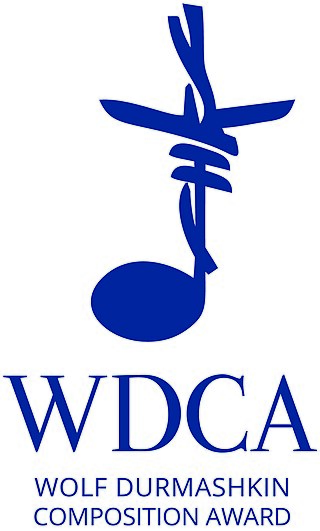
The Wolf Durmashkin Composition Award, short WDCA, is an international composition contest, as well as a music- and composition award designed by the German cultural society dieKunstBauStelle e. V. in Landsberg am Lech. It is named after the Jewish composer and conductor Wolf Durmashkin (1914–1944).























